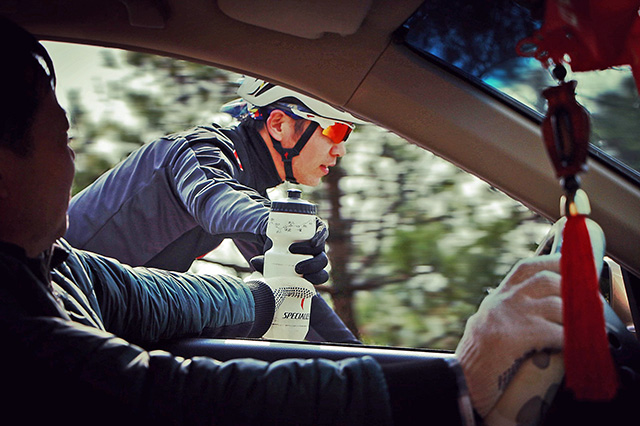Hydration is a very important area of the dietary needs of anyone undertaking exercise activities. It is important to get enough fluids before competition and training, but also it is important to re-hydrate after exercise to replace the fluid losses from exercise and to aid recovery.
Why drink
The body is composed of approximately 60% water, and an adequate amount of body water is essential for proper body function. The body keeps cool by sweating, though this results in the loss of body fluids and electrolytes. The amount of fluid lost depends not only on the environmental temperature but on the humidity as well. Although there are some electrolytes lost in sweat, particularly sodium and chloride, there is a much greater proportion of water lost. Therefore replacing the water is far more important than the replacement of electrolytes.
Affect on performance
A decrease of 2% of body weight is known to significantly decrease performance. For a 60 kg person, this equates to a loss of 1.2 kg. Greater levels of dehydration can potentially lead to health problems. Thirst is not a good indicator of when your body needs fluid. By the time you are thirsty, you probably have already lost more than 2% of your body weight.
Are You Dehydrated?
You should be aware of when you are dehydrated. Feeling thirsty is not a good indicator. See this article on methods for measuring hydration levels, which includes a link to this urine color test, a simple method to determine your hydration status by monitoring your urine color. See also the more scientific method to measure urine specific gravity using a refractometer, and other ways of testing sweat and hydration levels.
 hydrating during a cycling race
hydrating during a cycling race How much to drink
Most fluid is lost from the body through sweating. Fluid is also lost when you go to the toilet, and through the lungs. How do you know if you are drinking enough to replace these lost fluids? If you measure your body weight before and after training or before and after playing games, the difference between the two measures will tell you how much fluid you lost. Every 1 kg of body weight is equivalent to 1 liter of fluid. If you also take into account how much you drink, you can calculate how much fluid you lost through sweating, and how well you replaced this.
What to Drink, How Much and When
It is important to start exercise in a hydrated state, then replace fluids that are lost during and after exercise. Here are some articles on the topic of hydration in sports.
Hydration Guides
- Pre-Exercise Hydration — it is important to start exercise in a well-hydrated state.
- Drinking Strategies — how to maximize your fluid intake.
- What is the best 'Sports Drink'? — what should athletes drink, there are a lot of choices out there.
- How Much Water Should You Drink Per Day?
Types of Hydrating Fluids
The ideal replacement fluid consists mostly of water. The temperature of the fluid should be cool not warm, as this enables more rapid movement of the fluid out of the stomach. Cool water also helps to reduce body temperature. If a tournament is going to last for an extended period, try to take drinks regularly (every 15-20 minutes). Also, you should aim to be well hydrated prior to exercise (a couple of glasses of water 15-20 minutes prior to playing). Drinking coffee or other drinks containing caffeine is not recommended. Caffeine is a diuretic, which means it may cause the body to lose more fluid.
- Energy Drinks vs Sports Drinks — which one if any should an athlete drink?
- Sports Drinks for Recreational Runners — for hydrating and fueling a run, or rehydrating and refueling as part of recovery.
- Milk for Rehydration and Recovery — using milk as a rehydration solution may also help to fulfill protein and carbohydrate needs of an athlete post-exercise.
- Celebrity Drink Endorsements — do you want to drink what the champions drink?
Sport Specific Hydration
- Hydration and Heat Management for Cricket
- Hydration for Golfers — specific guidelines and examples for golfers.
- Fluid Intake for Marathon Runners
- Hydration for Fire Fighters — it is not only sports people that need to stay hydrated.
- Hydration for Tenpin — an important aspect of bowling nutrition, though often overlooked, is hydration.
Related Pages
- Monitoring body temperature
- Urine Color Test


 Current Events
Current Events